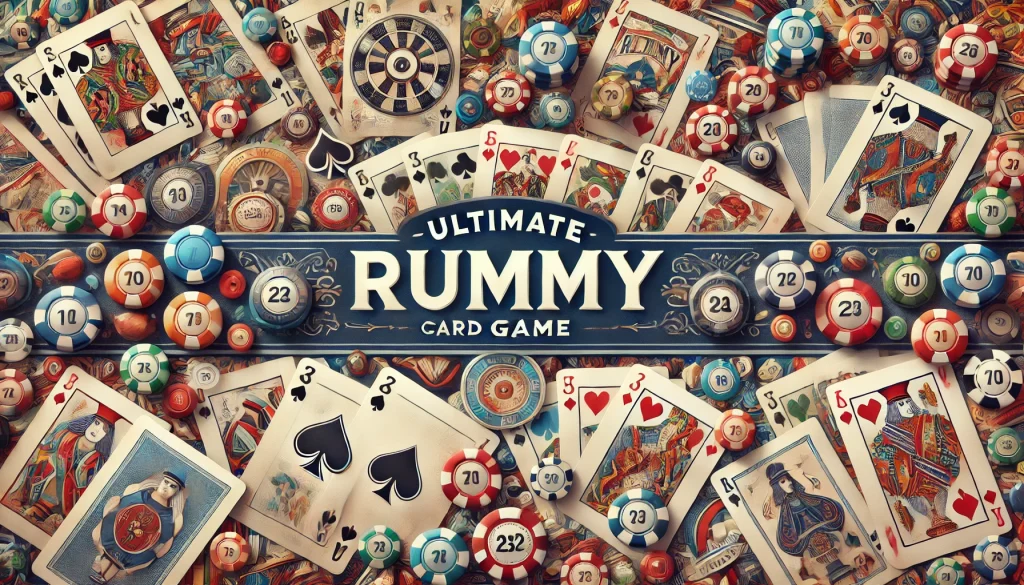Description

With its unique rummy culture combination of skill, strategy, and chance, rummy is a captivating card game that has captivated players for generations and across geographic boundaries. Rummy is essentially about forming runs or sets 777 slots of cards, which can be accomplished by discarding Classic 777 Slots APK & melding cards. Numerous variations have emerged from this straightforward but captivating idea, each with its own special rules & tactics. With roots in the Mexican game of Conquian, the game’s history dates back to the early 1800s and has since spread throughout the world.
Rummy is appealing not only for its gameplay but also for its social component. Rummy, which has historically been played in homes & social settings, encourages player interaction and is a well-liked option for friendly competitions & family game nights. In addition to finding a new home in the digital sphere, the game has evolved with technology, enabling fans to compete against players worldwide. The many variations of Rummy are examined in this article, including traditional, contemporary, regional, and specialized variants, as well as the rapidly growing realm of online Rummy games.
Many of the contemporary adaptations of Rummy are based on the original models. Gin Rummy, which gained popularity in the early 20th century, is the most well-known variation. The goal of Gin Rummy is for two players to create sequences of three or more cards in the same suit or melds of three or more cards of the same rank. Players attempt to “knock” when they think their opponent has a higher total value of unmatched cards than they do.
The game is played over multiple rounds. Choosing when to knock & how to use one’s hand effectively are the strategic components. Indian Rummy is another traditional variation that can accommodate two to six players and usually uses two decks of cards.
Players must create legitimate sets & sequences, and the goal is still the same. However, the idea of jokers—which can be used as wild cards to replace any card in a meld—is introduced in Indian Rummy. Players now have to pay attention to both their own hands & their opponents’ moves, which adds another level of strategy and complexity. Intense moments of suspense are often created when players reveal their hands in a thrilling finish to the game.
Rummy’s variants have changed along with it, giving rise to contemporary versions that satisfy a range of player tastes. Kalooki is one such variation that is especially well-liked in the Caribbean & Europe. While introducing new regulations pertaining to the quantity of cards dealt and the use of wild cards, Kalooki combines aspects of both traditional Rummy & Gin Rummy. In order to keep opponents from forming their own sets, players strategically manage their discards while attempting to create melds. Another contemporary variation is Contract Rummy, which adds a twist by requiring players to fulfill particular contracts at the end of each round.
The kinds of melds that are necessary are specified in these contracts, such as forming a specific number of sets or runs. Since players must modify their gameplay in response to the contracts that change throughout the game, this variation promotes flexibility and strategic planning. Contract Rummy is a popular game among players looking for a novel twist on classic gameplay because of its dynamic nature, which keeps players interested and alert. Because of rummy’s versatility, regional variations that represent local tastes and cultures have emerged. Persian rummy, which is well-liked in Iran & the surrounding areas, is one prominent example.
With two decks of cards, players try to create sets and sequences in this variation, which also includes special scoring methods based on card values. Persian rummy has a strong social component and is frequently used as a unifying activity at celebrations or family get-togethers. Filipino Rummy, on the other hand, takes a different tack by focusing on cooperation and teamwork. With up to eight players & two decks, this variation enables partnerships in which players collaborate to create melds.
Strategy is incorporated into the game since partners have to watch their opponents’ moves and communicate clearly. Filipino Rummy is a prime example of how local modifications can foster a feeling of belonging and friendship among participants. Specialized Rummy variants offer distinct mechanics that distinguish them from more conventional versions, often catering to niche markets or particular gaming preferences. Mahjong Rummy is one such variant that incorporates aspects of both Mahjong and conventional Rummy. Players navigate through complex tile arrangements while using tiles in place of cards in an effort to form melds.
Fans of both games will enjoy this hybrid approach, which presents a novel experience that tests players’ strategic thinking. Another specialized variation is Progressive Rummy, which adds a tournament-style structure in which players compete with increasing stakes over several rounds. Every round has different goals and challenges, so players must constantly modify their tactics. Because it encourages a friendly yet competitive environment, this variation is especially well-liked in social settings where groups enjoy prolonged gaming sessions.
Players’ interactions with games like Rummy have been completely transformed by the digital age. There are now websites that let users enjoy their preferred variations while using mobile devices or in the comfort of their own homes. Because of their frequently intuitive user interfaces, these platforms allow players to join games fast or compete against players from all over the world in tournaments.
Also, online rummy games offer cutting-edge features that improve the gaming experience, like leaderboards, live chat capabilities, and customizable avatars. Beginner tutorials are available on many platforms, which facilitates new users’ understanding of the guidelines and tactics related to various variations. Online play also makes scheduling flexible; players can locate opponents day or night, guaranteeing that the excitement of competition is always available. Knowing the rules is only one aspect of mastering rummy; other skills include flexibility and strategic thinking.
One basic piece of advice is to closely observe the cards your opponents discard; this can give you important information about their hand and guide your own choices. An opponent may not be pursuing that specific set or run, for example, if they discard a card that you need for a meld. Effective hand management requires striking a balance between forming melds and leaving your options open. As the game progresses, it can be beneficial to hold onto versatile cards that can contribute to several possible melds.
Jokers are also easy to use for melds, but if you keep them around for too long, you may not be able to modify your plan in response to shifting conditions. Because of its lengthy history and wide variety of variations that accommodate varying player tastes & skill levels, rummy has maintained its appeal over time. There is a variation for everyone, ranging from traditional games like Gin Rummy to more contemporary variations like Contract Rummy & niche versions like Mahjong Rummy. This popular game is now even more accessible thanks to the growth of online platforms, which enable players all over the world to interact & compete.
As players experiment with the different variations of Rummy, they will learn about the social ties that form at the card table as well as the excitement of competition. Rummy is still a popular game among people of all ages and cultures, whether they are playing it casually with friends or competing fiercely online.lottery sambad old

